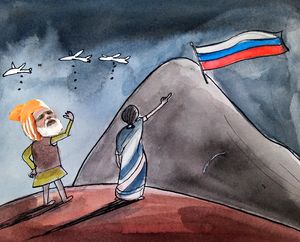Describing herself as a senior chief minister and the leader of a national party, Mamata Banerjee has extended her full support to the Narendra Modi government’s diplomatic efforts to end Russia’s war on Ukraine. In a two-page letter, she expressed her anguish over the suffering of Ukrainians as well as that of Indians stranded in the war zone. She highlighted the long tradition of domestic political consensus during international crises and asked the prime minister to convene an all-party meeting.
The letter has caused raised eyebrows in the BJP, given Mamata’s spat with West Bengal Governor Jagdeep Dhankhar and her war of words with Modi last year. But, for Modi—who is engaged in a balancing act with the west and the east—the letter from the country’s only woman chief minister, who also commands good numbers in Parliament, has been welcome.
Analysts see shifts in Indian policy, after Russian President Vladimir Putin hosted Pakistan Prime Minister Imran Khan in Moscow hours after declaring war on Ukraine. Along with Chinese support to Putin, this means the coming together of three nuclear powers in the Asia-Euro sector. But, given the depth of India’s connection with Russia and the continued dependence on it in multiple sectors, there is unanimity in strategic and political circles that the government’s response will have to be measured.
Mamata’s suggestion of an all-party meeting to discuss the crisis, especially when Parliament is not in session, is a good one. However, there has not always been domestic political consensus during international crises. In 1988, when the Rajiv Gandhi government sent the Indian Peace-Keeping Force to civil war-torn Sri Lanka, there was strong resistance from the Dravida Munnetra Kazhagam and its allies in Tamil Nadu. They accused the Centre of aiding Tamil genocide.
Prime minister Atal Bihari Vajpayee used the lack of political consensus to deflect American pressure. When president George W. Bush wanted India to send troops to Iraq, the opposition parties told Vajpayee that India should not send any uniformed men to a conflict zone unless it was under the mandate of the United Nations. Vajpayee told Bush that he was helpless as political consensus was against honouring the president’s demand.
But, summoning all-party meetings has become the norm for prime ministers, especially of coalition and minority governments in the last three decades. When all-party meetings have been held on national security and international issues, the normal response of the opposition has been to suggest that the government should act as it deemed best because it would know the full facts.
The Modi government has not been holding regular meetings on international policy. While there are informal briefings by the external affairs minister or the defence minister to select political parties on specific issues, the number of all-party meetings on strategic and diplomatic issues have been far fewer under the current regime. The Ukraine crisis is an opportunity to hear the views of the opposition and also give them the government’s assessment on the multilayered and complex issues involved, including possible negative effects on economic recovery. Mamata has shown the lead in seeking a consensus on the Ukraine issue, which at one level portends a change to the current world order and at another can lead to a mess on many fronts.
sachi@theweek.in


